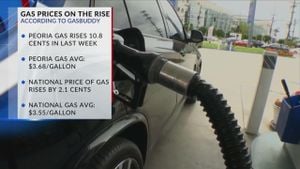Ecuador is grappling with its most severe power crisis in over six decades, driven by the driest conditions the country has seen since 1964. The prolonged drought, officially recorded at more than 71 days without significant rainfall, has critically diminished the water reservoirs necessary for the country’s predominantly hydroelectric power generation system, which provides roughly 70% of its electricity supply.
Recognizing the dire situation, President Daniel Noboa recently announced emergency measures, initiating rolling blackouts across the nation earlier than planned. These planned outages, initially set to begin Monday, have already forced local authorities to implement power cuts from 8 AM to 5 PM across 12 provinces over the past weekend. They aim to conserve energy and manage the dwindling resources amid forecasts of continued dry weather.
The drought’s impact has not only triggered blackouts but also necessitated water rationing measures. Quito, the capital city, is among the most affected areas where water supplies have been restricted for around 60 neighborhoods. The current crisis forces comparisons with past incidents; just months ago, Ecuadorians faced similar electricity rationing tied to earlier droughts.
President Noboa has openly criticized previous administrations for neglecting infrastructure maintenance and failing to establish effective contingency plans to address such significant climatic challenges. He emphasized the need for more proactive measures should water levels fail to rebound significantly, warning citizens of potential extended blackouts or additional emergency interventions.
Although Ecuador is facing this severe crisis independently, neighboring countries aren’t faring much besser. A regional climatological disaster is underway with countries like Peru and Colombia experiencing historic drought conditions. Wildfires have erupted across South America, fueled by the intense heat and dry conditions, exacerbated by the persistent el Niño phenomenon affecting global weather patterns.
Indeed, as droughts intensify, wildfires have devastated substantial areas of the Amazon and Pantanal regions of Brazil, Bolivia, and Peru. Colombian firefighters are currently battling numerous blazes, which have already ravaged approx 11,000 hectares (27,000 acres) of land.
This urgent situation prompted the Ecuadorian government to move swiftly. Along with enforcing blackouts, several measures have been put forth, such as requiring public sector workers to work remotely during heavy periods of energy scarcity. The intention behind this strategy is to mitigate energy demand on typical working days.
Last week, the government resorted to preventative measures including systematic investigations and maintenance checks at various substations, acknowledging the dual responsibility of infrastructure challenges and climatic influences. Significant security has been enacted, with military personnel deployed to safeguard major hydroelectric facilities.
International entities remain on alert, with the U.S. Embassy warning its citizens about increased military and police activity during these rolling blackouts. While flights remain active, American nationals have been advised to limit travel during this turbulent period and be cautious on the roads due to checkpoints.
Looking back, this recent energy crisis is the continuation of challenges Ecuador has faced over the last couple of years. Since declaring a state of emergency in the power sector earlier this year, President Noboa has been vocal about his administration’s determination to combat energy shortages stemming from resource mismanagement and climate-related phenomena.
The urgency is palpable, and measures being taken include exploring alternative electricity sources. Among these strategies is commissioning Turkish power generation barges which aim to integrate additional electricity supplies to bolster the national grid. Just last week, one of these barges began its operations, seeking to help stabilize the current energy situation of the nation.
Despite these efforts, experts speculate if these solutions are enough amid the pressing climate realities. The lack of rain not only raises concerns about energy but also threatens local farmers and food security, raising bigger questions about the European country’s future resilience to climate extremes.
Recent studies suggest the drought's frequency and severity have intensified due to climate change, which amplifies the call for immediate interventions, sustainability planning, and international cooperation for longer-term adaptability to such dire scenarios. Citizens found themselves grappling with increasing frustrations as blackouts, water shortages, and uncertainties ruled their daily lives.
Social media platforms have erupted with public sentiments expressing dissatisfaction with the government’s handling of the crisis, as urban areas continue to take the brunt of the impacts. People lament missed electricity, inconveniences faced due to power outages, and their impacts on productivity and quality of life.
Engagement from local community leaders and advocacy groups rises to counter these adverse effects, seeking to collaborate with government entities on pressing solutions. Hence the situation compels both the government and the people to reflect, adapt and take responsible actions to safeguard their future survival.
Though the presidency remains committed to keeping Ecuador's lights on, the lasting ramifications of the drought, the before-mentioned infrastructural negligence, and ineffective planning linger throughout the discussions surrounding ecological management and national resilience.
The transition toward renewable energy avenues grows increasingly necessary, pushing Ecuadorians to rethink their energy dependency and welcome sustainable practices toward resource management. Amidst the chaos, hope remains tethered to the collective resolve of the nation to weather this storm and adapt fort he challenges which lay abaixo.



